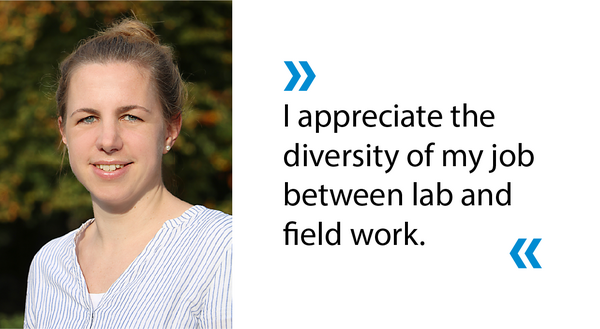Dr. Caroline Buchen-Tschiskale
Scientist and laboratory manager at the Thünen Institute of Climate-Smart Agriculture

Stable isotopes are an integral part of Caroline Buchen-Tschiskale's research life: the 36-year-old heads the laboratory for the analysis of stable isotopes at the Thünen Institute of Climate-Smart Agriculture. She specialises in the analysis of isotope abundances in air, water, soil and plant samples. The stable isotopes studied herehelp to improve our understanding of processes in the fields of carbon dynamics and formation of greenhouse gases in soils.
The agricultural and environmental scientist already focussed on stable isotopes in her master's thesis as part of a DFG research group in the Philippines. Her PhD project, which also included field trials with the Lower Saxony Chamber of Agriculture, took her to the Thünen Institute. Here she investigated nitrogen dynamics and their gaseous losses in the form of nitrous oxide (N2O) and di-nitrogen (N2) during grassland renewal and ploughing using stable isotopes. She then moved to ZALF - as head of the stable isotope laboratory. "I defended my dissertation on Fridays and started to work in Müncheberg on Mondays," the scientist remembers. Two years later, she returned to the Thünen Institute to coordinate the GülleBest project.
In May 2021, she she became as head of the stable isotope analysis laboratory and has been a permanent employee since then. "I can organise my work with maximum flexibility, which is what I like about the Thünen Institute," says the scientist, who works three days a week in Braunschweig and two days from home. If necessary, however, she also travels to the lab on a home office day, because regular dialogue with her team is very important to her: "It's the only way to make the lab and the teamwork work."
Despite the lab work, Caroline Buchen-Tschiskale still works as a scientist on various projects - currently on two BLE and one DFG project, among others. "The great thing about my job," says the scientist, "is that, unlike most lab managers, I'm not just responsible for the analyses, but can accompany the sample from its collection in the field to its data evaluation."






